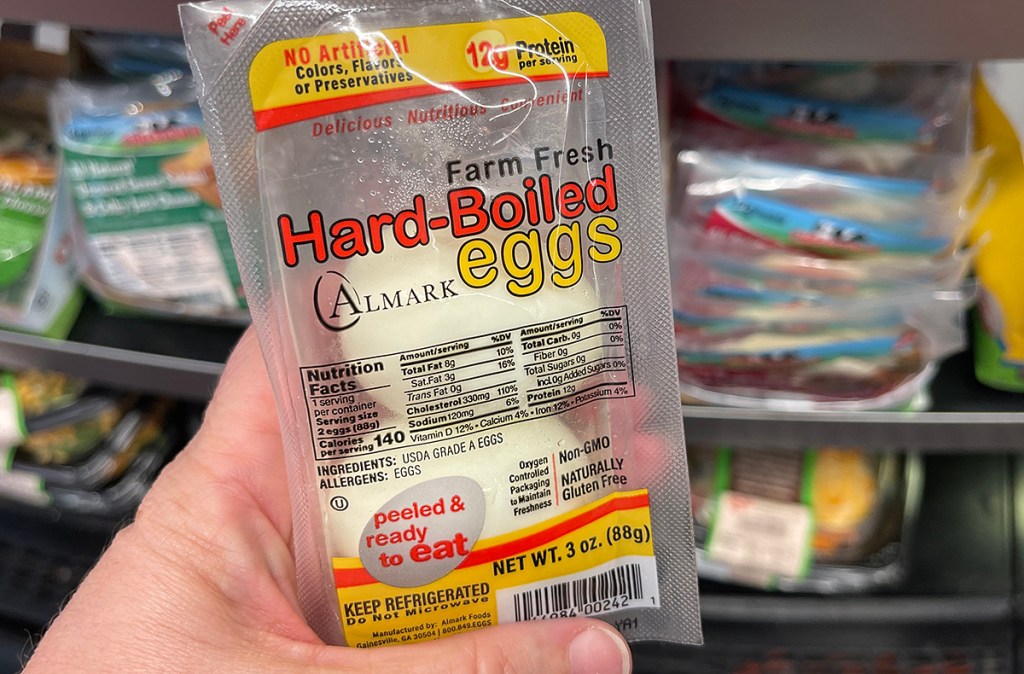Gas Station Eggs: Why The Search Fails & Where To Look
Ever found yourself on a road trip, stomach growling, and the only beacon of hope in sight is a gas station? The burning question then becomes: Can you actually buy eggs at a gas station? The answer, surprisingly, is more nuanced than a simple yes or no.
The availability of eggs at gas stations is a geographically dependent reality, influenced by factors such as location, the size of the station, and the overall demand from the local community. In urban centers, larger gas stations operating under well-known chains often stock a limited range of grocery items, including eggs. These might be found in refrigerated sections alongside milk, cheese, and other convenience foods. However, venturing into more rural areas or smaller, independently owned gas stations significantly decreases the likelihood of finding eggs. These establishments typically focus on fuel, snacks, beverages, and automotive supplies, with limited space or resources for perishable goods.
Beyond location, the type of gas station itself plays a crucial role. Major chains like Circle K, 7-Eleven, or QuikTrip are more likely to offer eggs than smaller, independent outlets. These larger chains have established supply chains and distribution networks that allow them to stock a wider variety of products, including refrigerated items. Their size and purchasing power enable them to negotiate better deals with suppliers, making it economically viable to carry items like eggs. Smaller gas stations, on the other hand, often rely on local suppliers and may not have the infrastructure or demand to justify stocking perishable goods. This variability highlights the need for a strategic approach to egg acquisition when relying on gas stations as a potential source.
- Coachella Wristband Guide 2025 Registration Tips More
- Remote Iot Ssh Fix Search Secure Raspberry Pi Access
The issue of shelf life and storage is another critical factor. Eggs are perishable items that require proper refrigeration to maintain their quality and safety. Gas stations must adhere to strict food safety regulations to ensure that the eggs they sell are fit for consumption. This includes maintaining proper temperature controls, regularly inspecting eggs for cracks or spoilage, and adhering to sell-by dates. Smaller gas stations may lack the necessary refrigeration equipment or staff training to handle perishable goods effectively, making them less likely to stock eggs. Consumers should always check the sell-by date and inspect eggs for any signs of damage before purchasing them from a gas station. If eggs are not properly refrigerated or appear to be cracked, they should not be consumed.
The demand for eggs at gas stations is also a factor influencing their availability. In areas where there is a high demand for convenience foods, gas stations are more likely to stock eggs to cater to the needs of their customers. This is particularly true in areas with a large population of commuters or travelers who may need to pick up essential groceries on the go. However, in areas where there is less demand for convenience foods, gas stations may not see it as economically viable to stock eggs. The demand for eggs can also vary depending on the time of year. For example, demand may be higher during holiday seasons or when there are local events taking place. Gas stations will often adjust their inventory based on seasonal demand patterns.
Alternatives to gas stations for purchasing eggs include grocery stores, convenience stores, and farmers' markets. Grocery stores typically offer the widest selection of eggs, including different grades, sizes, and brands. They also have the most stringent food safety standards and are more likely to have properly refrigerated eggs. Convenience stores are another option, but they may have a smaller selection and higher prices than grocery stores. Farmers' markets are a good option for purchasing fresh, locally sourced eggs, but they may only be open on certain days of the week. When considering where to buy eggs, it is important to weigh the factors of convenience, price, and quality.
- Jackerman Exploring The Enigmatic 3d Artist Mother Warmth
- Hawk Tuah Girl Hailey Welchs Viral Fame Whats Next
The price of eggs at gas stations can vary depending on the location, the type of gas station, and the brand of eggs. Generally, eggs at gas stations are more expensive than at grocery stores due to the convenience factor and the higher overhead costs of running a gas station. However, the price difference may not be significant enough to deter consumers who are in a hurry or who need eggs outside of regular grocery store hours. Some gas stations may also offer discounts or promotions on eggs to attract customers. It is always a good idea to compare prices at different gas stations and grocery stores to find the best deal.
Consumer reviews and anecdotal evidence paint a mixed picture of the egg-buying experience at gas stations. Some customers report finding fresh, high-quality eggs at gas stations, while others complain of cracked shells, stale eggs, or high prices. These discrepancies highlight the importance of exercising caution when purchasing eggs from a gas station. It is always a good idea to inspect the eggs carefully before buying them and to check the sell-by date. Consumers can also leave reviews online to share their experiences with other shoppers. These reviews can help to inform purchasing decisions and to hold gas stations accountable for the quality of their products.
Ultimately, the decision of whether or not to buy eggs at a gas station comes down to personal preference and individual circumstances. If you are in a hurry, need eggs outside of regular grocery store hours, and are willing to pay a premium, then a gas station may be a convenient option. However, if you are looking for the best selection, the lowest prices, and the highest quality, then a grocery store is likely a better choice. Regardless of where you choose to buy your eggs, it is important to exercise caution and to inspect the eggs carefully before consuming them.
In conclusion, while the possibility of finding eggs at a gas station exists, it's far from a guarantee. The availability depends on a confluence of factors, including location, the specific gas station chain, storage conditions, and local demand. Consumers should approach the prospect with a degree of skepticism and be prepared to explore alternative options if necessary. The quest for eggs at a gas station is often a gamble, one where the odds of success are significantly influenced by external circumstances.
Whether you are embarking on a cross-country road trip or simply in need of a quick breakfast ingredient, the presence of eggs at gas stations remains a somewhat unpredictable element. Proper research and awareness of potential alternatives can ensure that your culinary needs are met, regardless of the geographical constraints or the limitations of the local convenience store.
| Attribute | Details |
|---|---|
| Name | N/A (General Information) |
| Date of Birth | N/A |
| Place of Birth | N/A |
| Education | N/A |
| Career | Information about availability of eggs at gas stations |
| Professional Information | Analysis of factors influencing availability, shelf life, demand, and alternatives. |
| Website | FDA Food Safety Guidelines |
Consider these scenarios: You're on a long drive, far from any supermarket, and suddenly crave an omelet. Or perhaps you're a local resident who's run out of eggs unexpectedly and the nearest store is closed. In such cases, gas stations, with their 24/7 accessibility, present a potential lifeline. However, the reality often clashes with expectation. The neatly arranged shelves of snacks and beverages might not extend to the refrigerated section, leaving you disappointed. The odds, as we've seen, are often stacked against finding those precious eggs.
But it's not just about satisfying immediate cravings. For travelers, the option of procuring eggs at a gas station could mean preparing a simple, cost-effective meal on the go, saving money on restaurant expenses. It could also provide a sense of normalcy and comfort, especially for those with dietary restrictions or preferences. The absence of eggs, on the other hand, could disrupt travel plans and necessitate detours or compromises.
Gas station owners themselves face a dilemma. Stocking eggs entails additional costs and responsibilities, including maintaining proper refrigeration, monitoring expiration dates, and ensuring compliance with food safety regulations. These requirements may not be feasible for smaller establishments with limited resources. On the other hand, offering eggs could attract more customers, especially those seeking convenience and a wider range of grocery items. The decision ultimately hinges on a careful assessment of costs, benefits, and local market conditions.
As the landscape of retail continues to evolve, gas stations are increasingly diversifying their offerings to cater to changing consumer demands. Many stations now feature expanded convenience stores with a wider selection of groceries, prepared foods, and even fresh produce. This trend could potentially lead to a greater availability of eggs at gas stations in the future. However, the extent of this expansion will depend on various factors, including competition from other retailers, regulatory changes, and the overall economic climate.
For consumers, the key is to manage expectations and adopt a pragmatic approach. Before embarking on a quest for eggs at a gas station, it's advisable to call ahead and inquire about availability. This simple step can save time and prevent disappointment. It's also prudent to consider alternative options, such as packing your own eggs or locating nearby grocery stores or convenience stores. With a little planning and preparation, you can ensure that your egg-related needs are met, regardless of the unpredictable nature of gas station inventories.
The question of eggs at gas stations also raises broader issues about food access and convenience. In many rural areas, gas stations are the only retail outlets available, making them crucial sources of essential goods. The absence of eggs at these locations could disproportionately affect vulnerable populations who rely on gas stations for their grocery needs. Policymakers and community organizations may need to address these disparities by promoting access to affordable and nutritious foods in underserved areas.
In conclusion, the availability of eggs at gas stations is a complex issue with no easy answer. It's a reflection of the changing retail landscape, the challenges of food distribution, and the diverse needs of consumers. While the odds may not always be in your favor, a little planning and preparation can increase your chances of success. And if all else fails, there's always the option of settling for a bag of chips and a sugary drink a classic gas station alternative.
So, the next time you find yourself wondering whether you can find eggs at a gas station, remember that the answer is neither a resounding yes nor a definitive no. It's a maybe, a perhaps, a possibility contingent on a multitude of factors. And that, in itself, is part of the quirky charm of roadside adventures and the unpredictable nature of convenience store inventories.
The enduring appeal of gas stations lies in their ability to adapt to the ever-changing needs of travelers and local communities. From fuel and snacks to beverages and basic groceries, gas stations strive to provide a convenient and accessible source of essential goods. While the availability of eggs may not always be guaranteed, the willingness of gas stations to cater to consumer demand suggests that the quest for eggs on the open road may become increasingly successful in the years to come.
- Lacy Kim Nurse Art Social Media Buzz Insights
- Ai Undress Tools Revealing The Power Amp Dangers New Trends

Great news! These gas station pickled eggs do NOT require refrigeration

What's Up With Gas Station Hard Boiled Eggs?

Best Keto Gas Station Snacks, Eat Keto On The Go Easily Hip2Keto